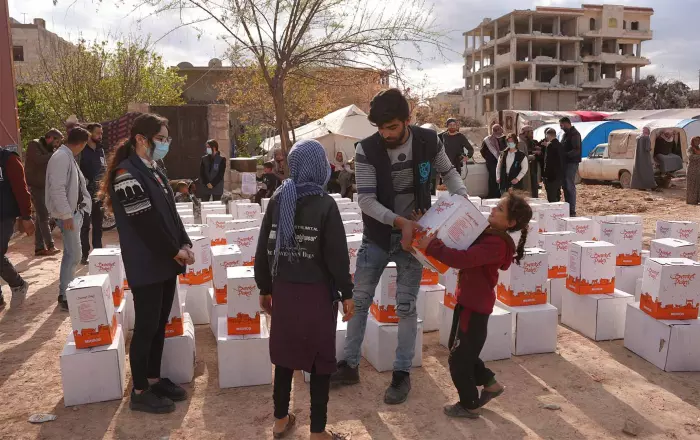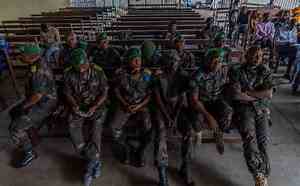
Humanitarian groups need cash to operate. But in many crisis hotspots, the biggest hurdle to accessing funding is often their own banks – leaving them scrambling for workarounds and slowing life-saving aid.
That’s what Dalell Mohmed found in the crucial days after earthquakes struck Syria and Türkiye in February when her NGO’s bank wouldn’t wire the cash needed to provide quick relief to some 12,000 people.
“When I reached out to our bank, they said it went into our compliance section, and then went back out, and then went back into compliance,” said Mohmed, director of Kinder USA, a Texas-based NGO with programmes helping children in parts of the Middle East.
Even though the programmes were in Türkiye, simply mentioning Syria in the bank wire transfer request memo triggered a lengthy screening process. The earthquakes killed more than 50,000 people on both sides of the border. Kinder USA’s wire transfer ended up being delayed for a month.
It’s a common problem for humanitarian groups responding to emergencies in some of the world’s most urgent crises – including in countries subject to international sanctions, counter-terrorism laws and financial crime regulations.
Many financial institutions consider Syria, as well as other areas in conflict, to be a “no banking zone”, due to the perceived risk of running afoul of these rules.
Fearful of transferring funds in these destabilised areas, banks often subject clients to extensive compliance measures, as seen by Kinder USA, or outright deny banking services – a practice known as “de-risking”.
Financial sector experts say the biggest roadblocks are caused by vague anti-money laundering and countering the finance of terrorism (AML/CFT) regulations – enforced in the US by a web of government agencies, and for which there are no viable humanitarian exemptions.
Bank de-risking can tie up humanitarian funding for months, stalling aid programmes and threatening operations.
A pre-earthquake study on Syria, for example, estimated that de-risking had reduced available cash by 35 per cent. Last year, the UN’s humanitarian coordination arm, OCHA, estimated that $1 million in funding for Libya was tied up for months due to AML/CFT-like laws in Libya and Europe. The problem is even more pronounced for local NGOs, who lack the reputation and resources of bigger aid groups.
De-risking is a global problem for humanitarian aid, but US regulations are particularly stringent. Many NGOs around the world are dependent on US-based donors, which accentuates the problem. The US Department of the Treasury recently issued guidance aimed at countering de-risking, targeted squarely at banks. But financial experts who work closely with the banking sector say more is needed to convince banks to change their practices and ensure government policy doesn’t scare them from working in crisis zones.
At the heart of banking fears is the Bank Secrecy Act, a 50-year-old regulatory framework designed to federally enforce AML/CFT measures through regular bank examinations. Crucially, this makes financial institutions the first line of defence against financial crime.
Federal regulators examine bank transactions, line by line, to assess whether they uphold AML/CFT obligations. Penalties can range from a formal reprimand to billions of US dollars in fines, stripping of their banking charter, and even prison time for individuals accused of “wilful violations”.
However, AML/CFT regulation as part of the Bank Secrecy Act is so vaguely defined that banks are unclear on the rules. The examiners’ manual, for example, states that bank compliance programmes must be “reasonably designed”. Afraid of damaging reviews, banks over-comply and de-risk NGOs working in countries seen as problematic – delaying or refusing to complete transfers.
“Inherently, they’re [humanitarian NGOs] working in high-risk places,” said Alex Zerden, a former US treasury department official, now founder of Capital Peak Strategies, a Washington-based consulting firm that advises companies on risk. “Some financial institutions do not want to incur the costs and the regulatory repercussions or legal liability of maintaining these relationships, which tend to be low, low value.”
“You shouldn’t be in this conflict zone. Don’t you know that there’s terrorist activity?”
The US government officially discourages de-risking, and emphasises that the vast majority of NGOs pose little or no risk of being abused for terrorist financing. The Financial Action Task Force (FATF), the leading global money laundering watchdog formed by G7 countries, notes the importance of protecting NGO programmes.
But supportive guidelines do not always trickle down to the actual bank examiners who audit financial institutions for compliance.
“I can tell you, more than anecdotally, where an examiner has said to a banker: ‘You shouldn’t be in this conflict zone. Don’t you know that there’s terrorist activity?’” said John Byrne, president of AML RightSource, a firm that specialises in anti-money laundering compliance.
“And if you’re [the banker] not pushing back on that, and it’s [the NGO client] not bringing a lot of return, what are you doing? You’re like, ‘Alright, I’ll exit the relationship.’”
- The New Humanitarian report











